Search Results
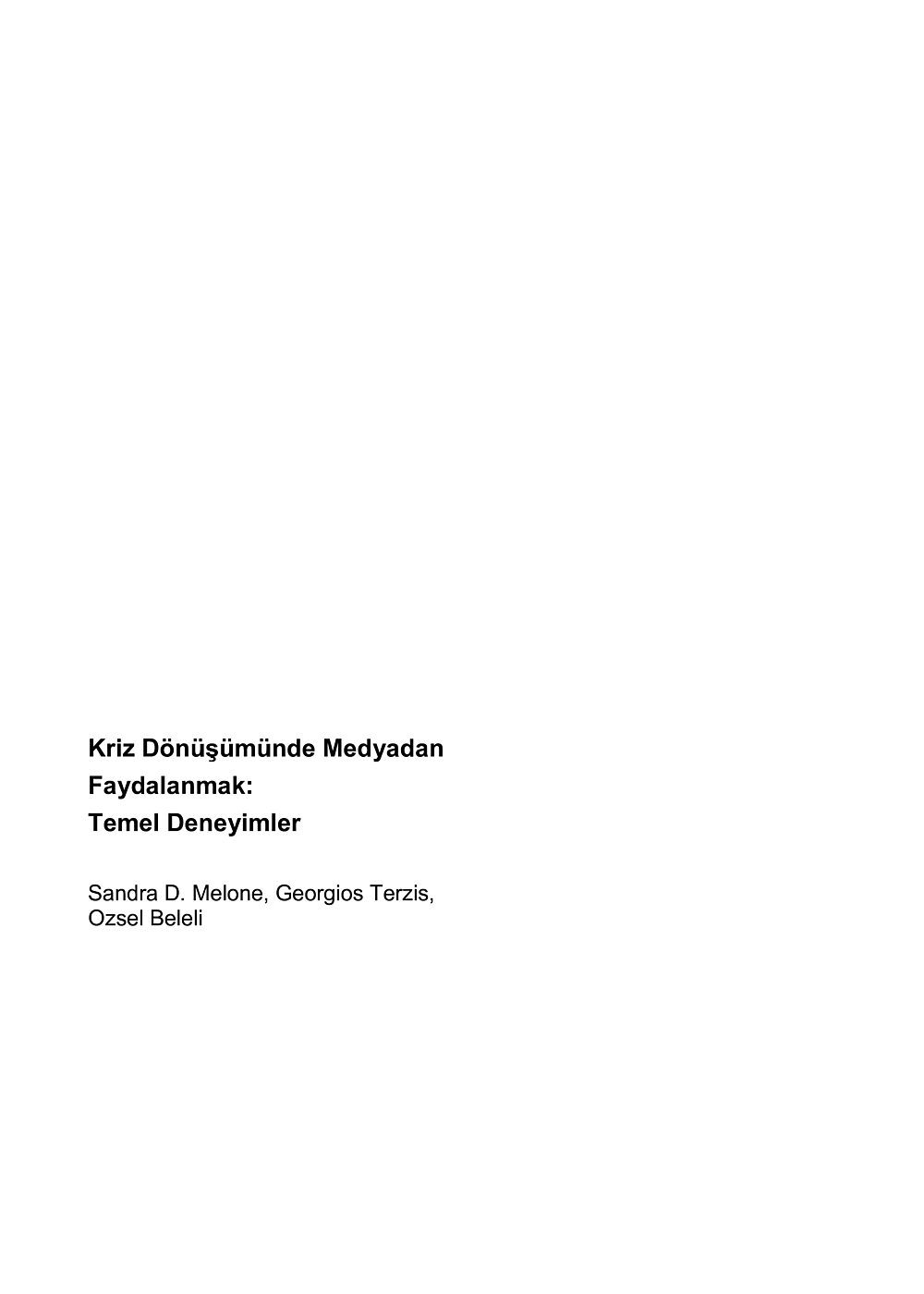
Kriz Dönüsümünde Medyadan Faydalanmak: Temel DeneyimlerHandbook Article
[Özet makine çevirisi] Medyanın etnopolitik çatışmada oynayabileceği role ilişkin bir vaka çalışması. Yazarlar, Yunanistan ve Türkiye, Makedonya, Sierra Leone ve Burundi'deki STK Avrupa Ortak Zemin Merkezi'nin girişimlerini tasvir ediyor ve medyayla işbirliği yapmayı, çoğulculuğu teşvik etmeyi ve gazetecilikte etik standartları teşvik etmeyi amaçlayan projelerin tasarımı, uygulanması ve değerlendirilmesi hakkında dersler paylaşıyorlar.
- Year 2002
- Author(s) Sandra Melone, Georgios Terzis, Ozsel Beleli
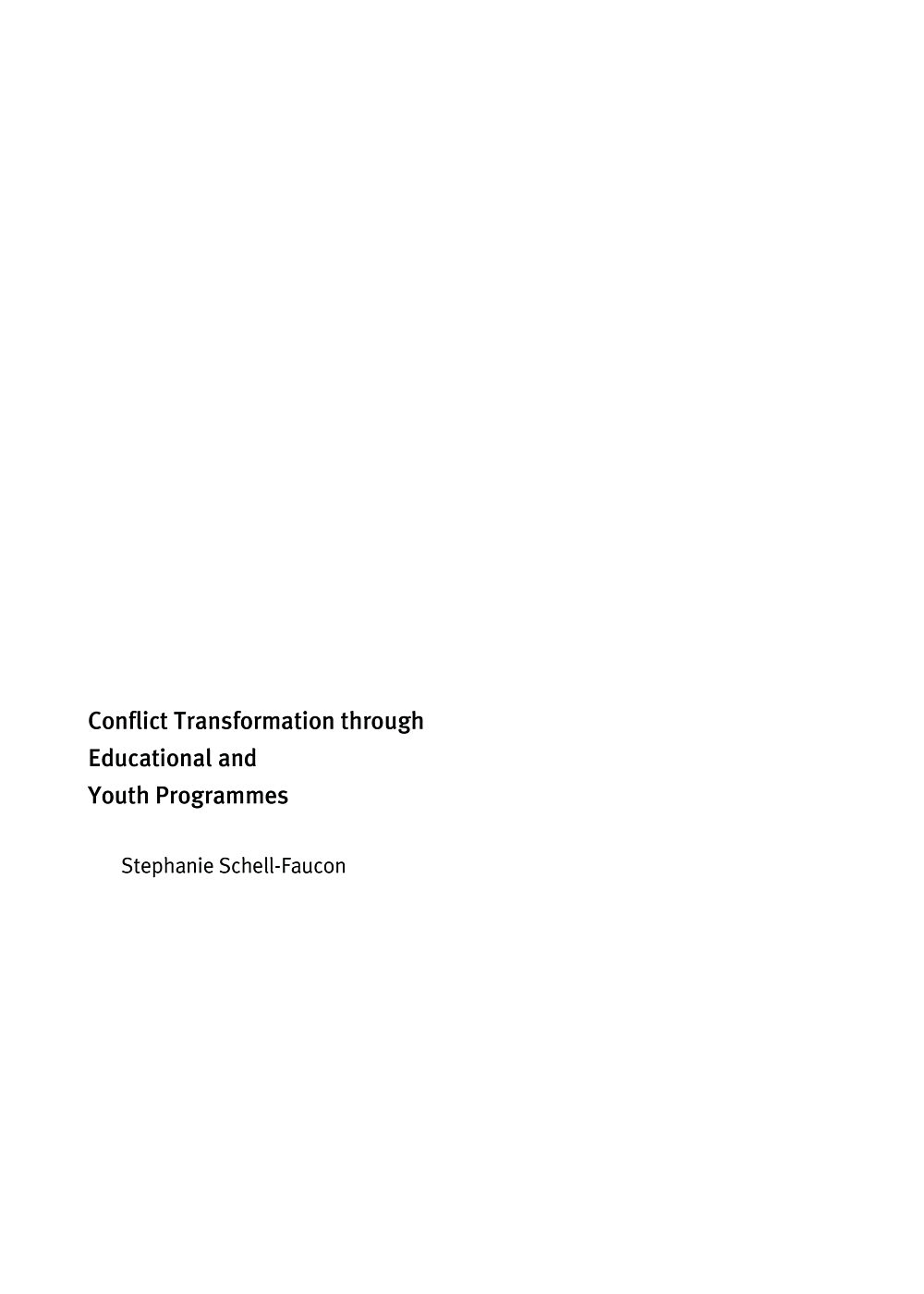
Conflict Transformation through Educational and Youth ProgrammesHandbook Article
Debates opportunities and limits for conflict transformation through youth and educational work. The author explores theoretical and conceptual approaches, catalogues key methodologies, learning principles and desired outcomes for both formal and informal education. She also addresses on-going challenges.
- Year 2001
- Author(s) Stephanie Schell-Faucon
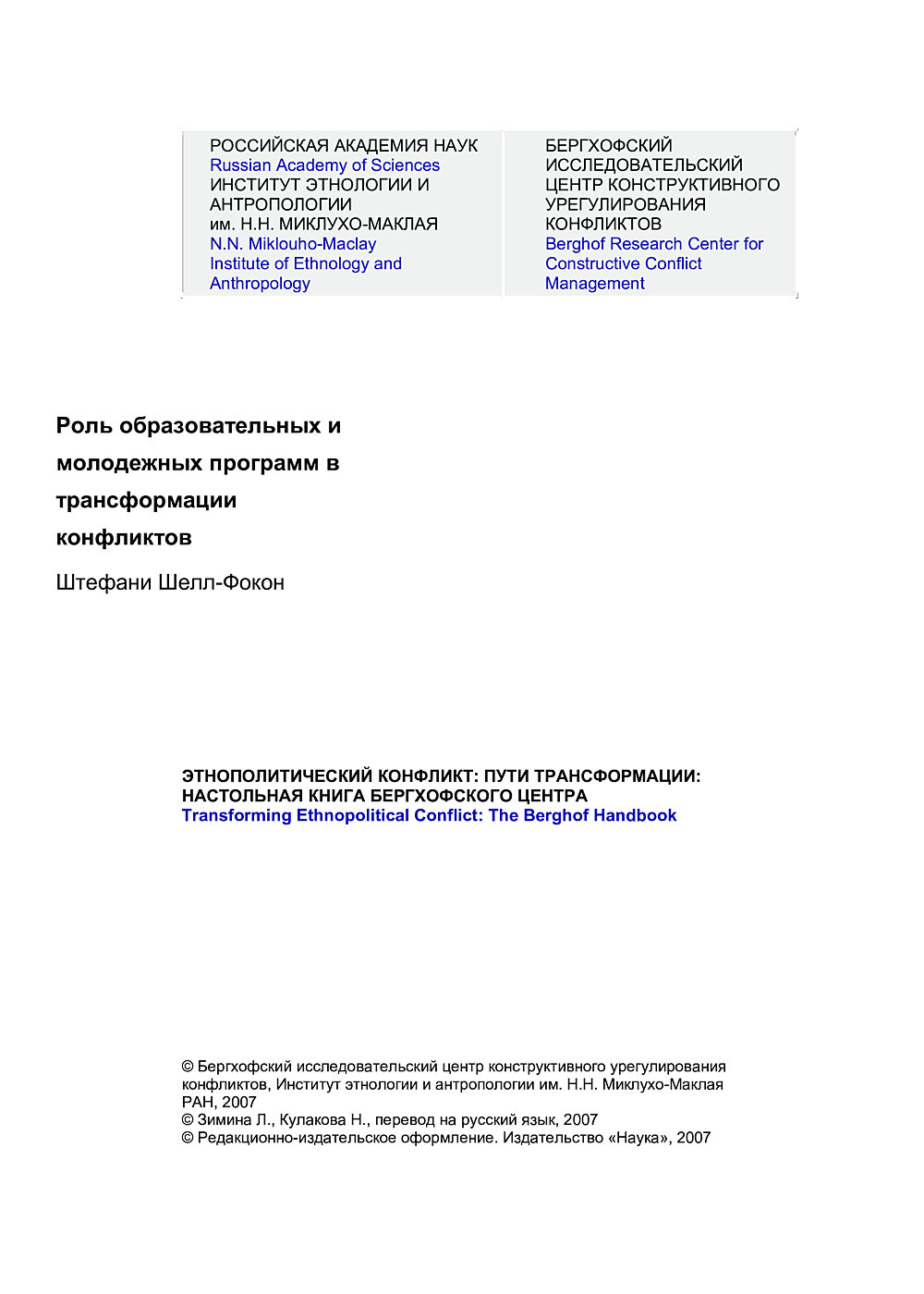
Роль образовательных и молодежных программ в трансформации конфликтовHandbook Article
[Аннотация машинный перевод] Обсуждаются возможности и ограничения трансформации конфликтов посредством молодежной и образовательной работы. Автор исследует теоретические и концептуальные подходы, каталогизирует ключевые методологии, принципы обучения и желаемые результаты как для формального, так и для неформального образования. Она также решает текущие проблемы.
- Year 2007
- Author(s) Stephanie Schell-Faucon
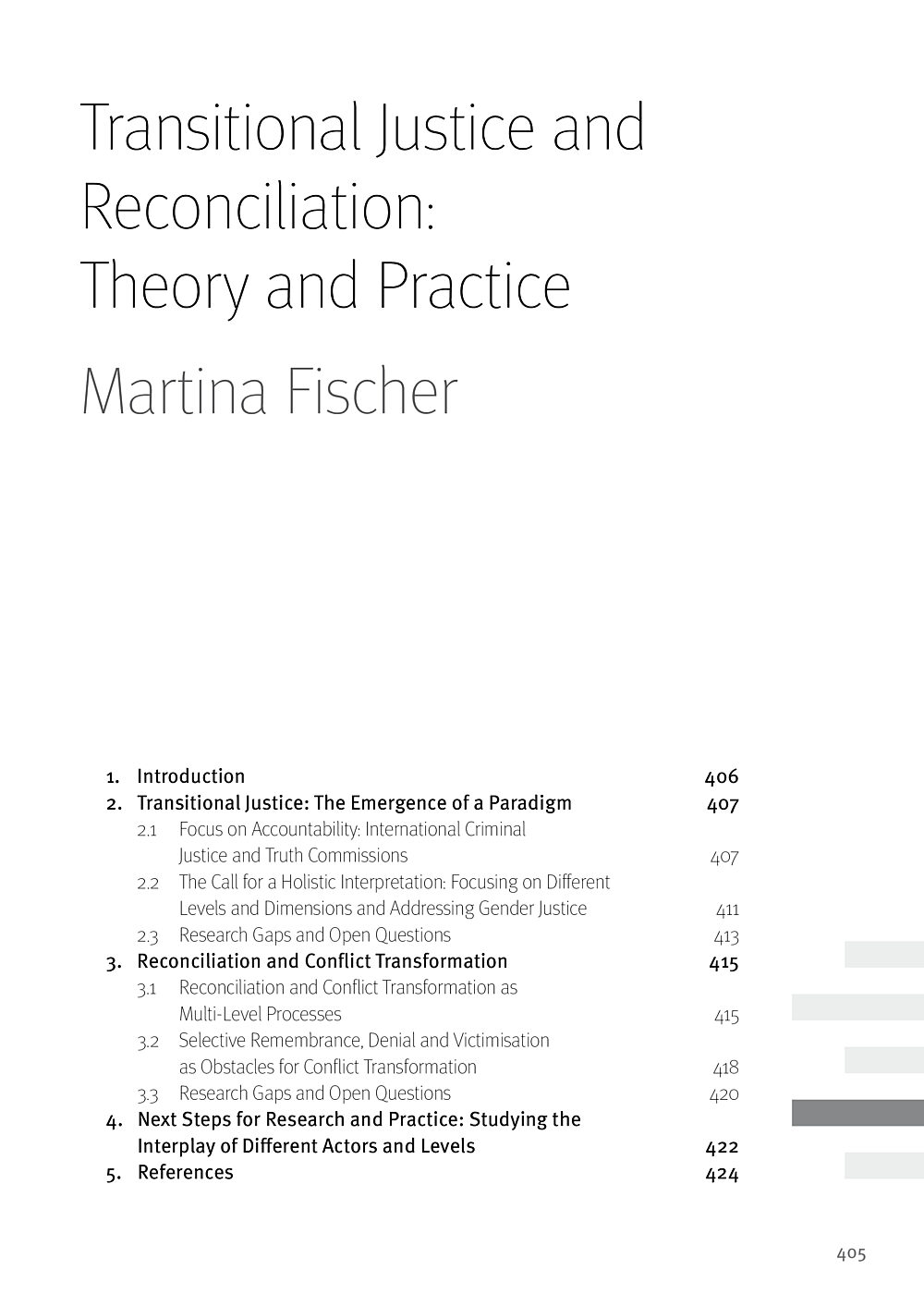
Transitional Justice and Reconciliation - Theory and PracticeHandbook Article
- Year 2011
- Author(s) Martina Fischer
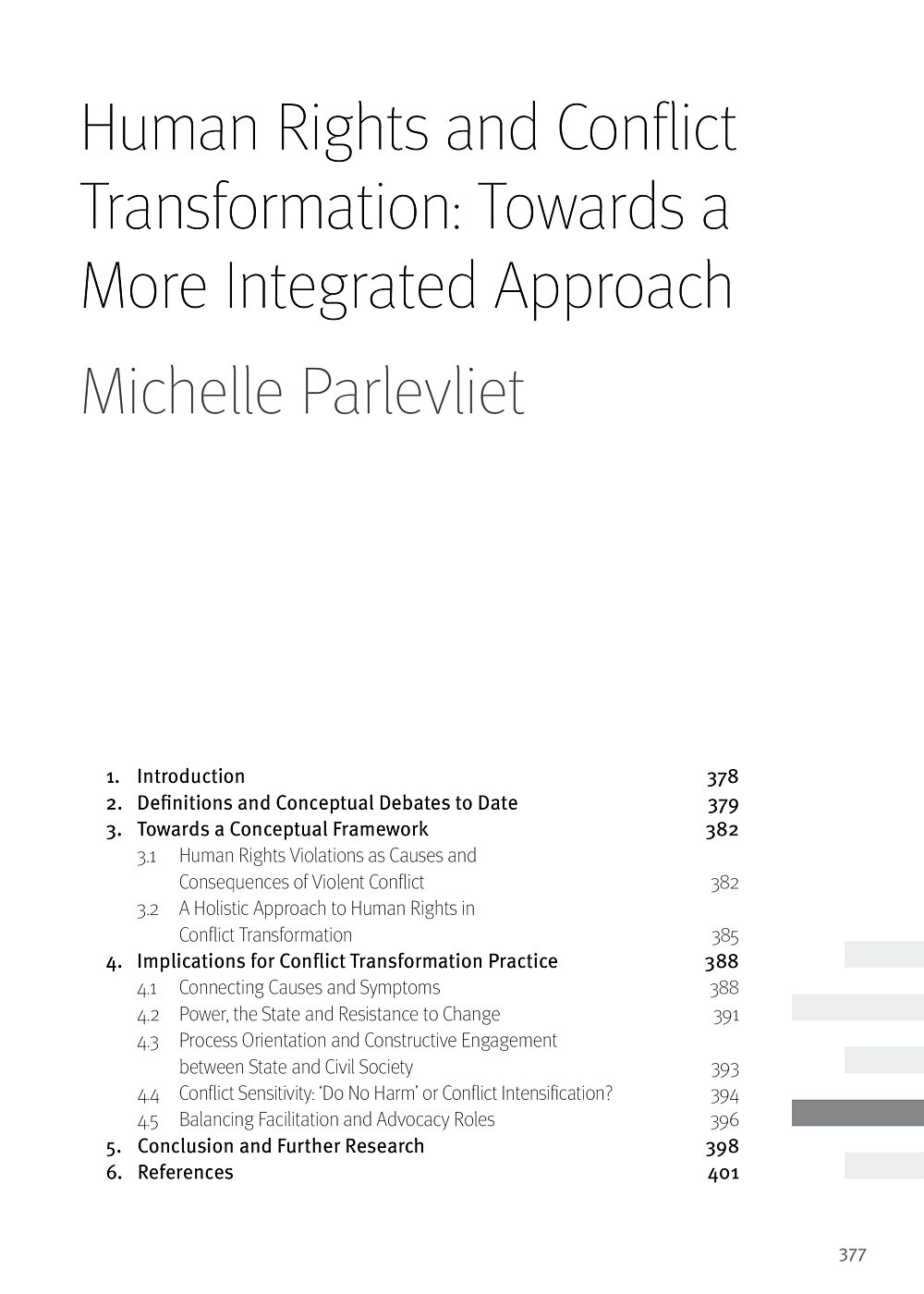
Human Rights and Conflict Transformation: Towards a More Integrated ApproachHandbook Article
- Year 2011
- Author(s) Michelle Parlevliet
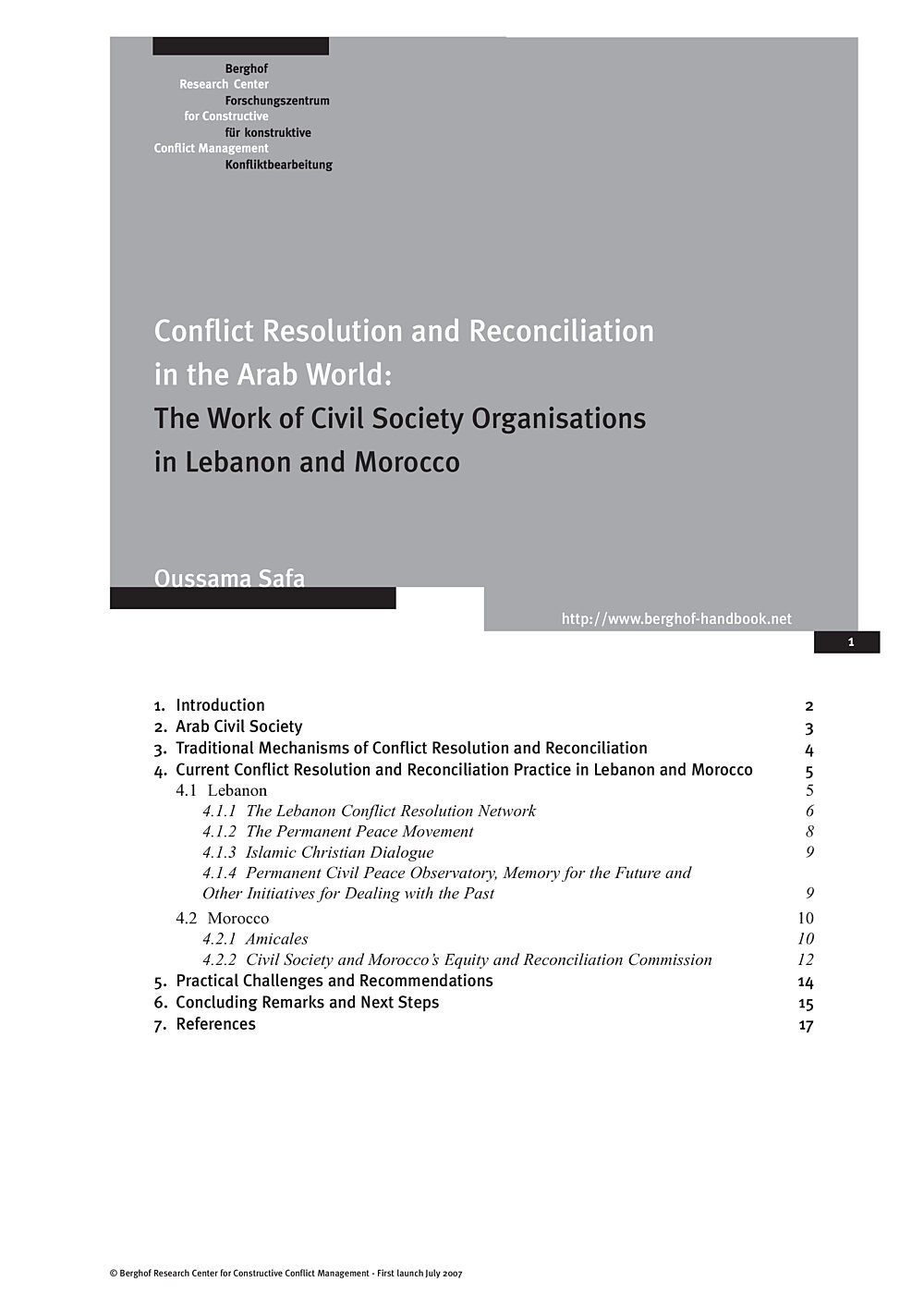
Conflict Resolution and Reconciliation in the Arab World: The Work of Civil Society Organisations in Lebanon and MoroccoHandbook Article
- Year 2007
- Author(s) Oussama Safa
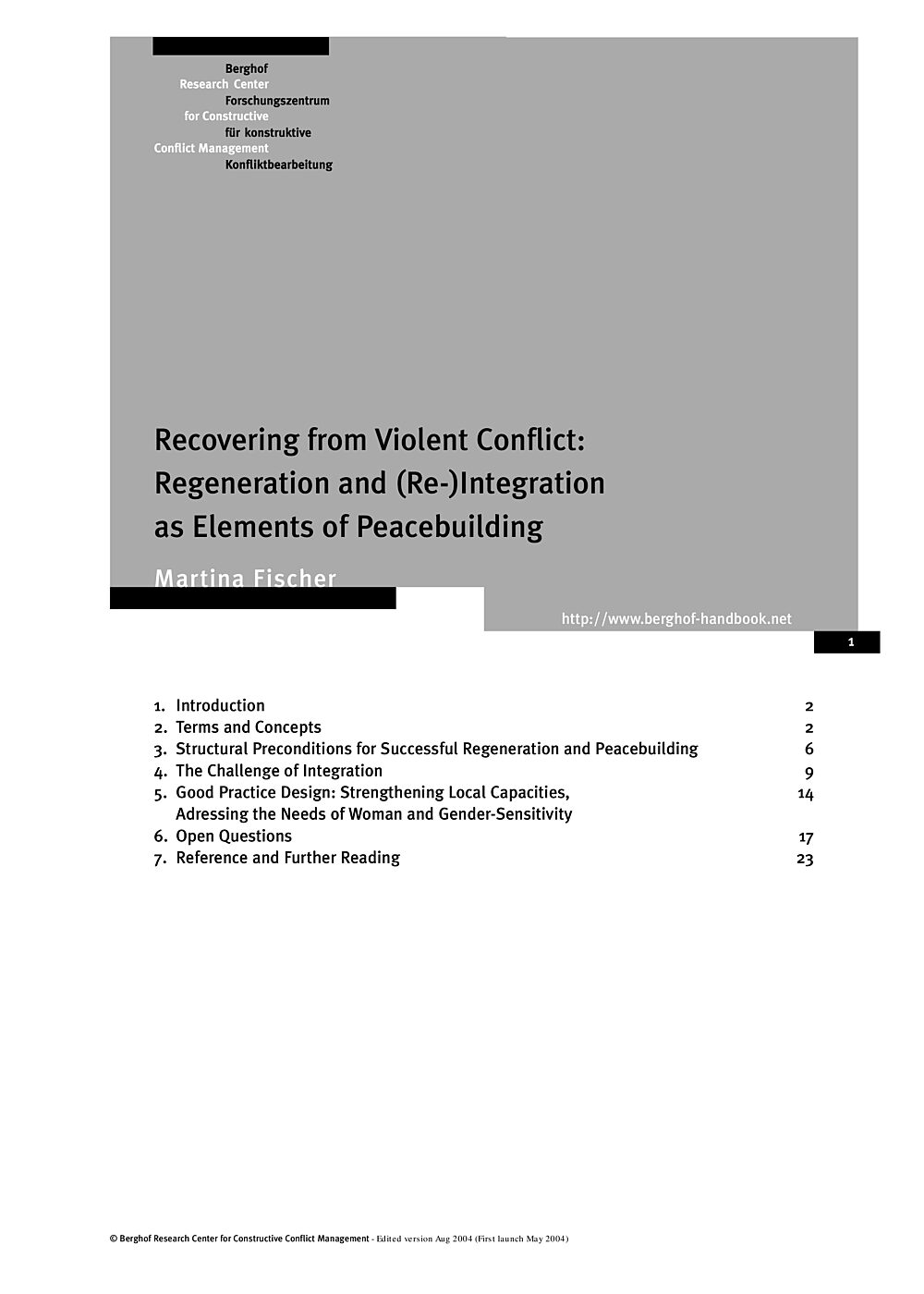
Recovering from Violent Conflict: Regeneration and (Re-)Integration as Elements of PeacebuildingHandbook Article
- Year 2004
- Author(s) Martina Fischer
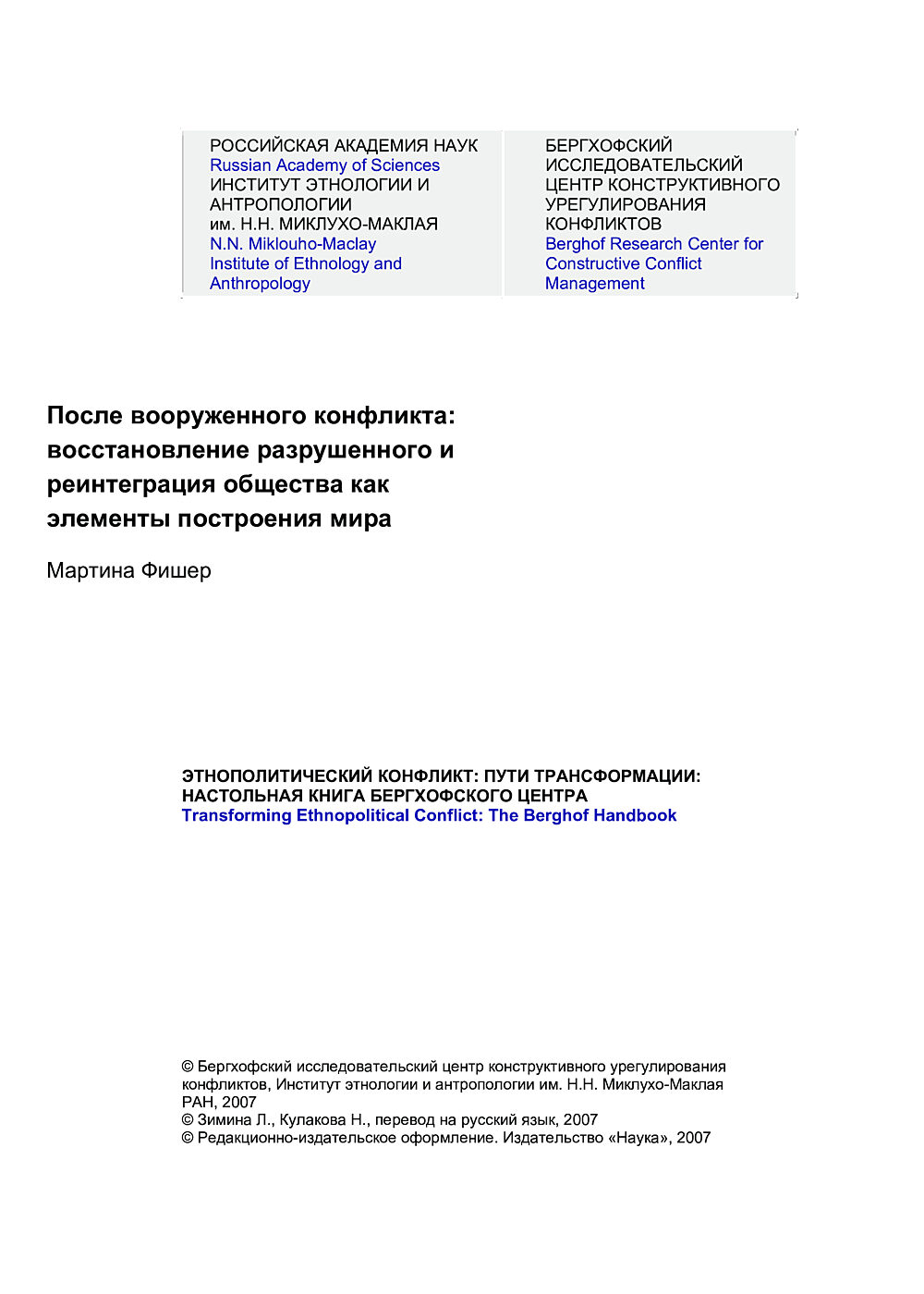
После вооруженного конфликта: восстановление разрушенного и реинтеграция общества как элементы построениHandbook Article
[Аннотация машинный перевод] Утверждает, что (ре) интеграция беженцев и перемещенных лиц является одной из основных проблем и предварительным условием трансформации конфликта. В этом процессе необходимы совместные усилия, которые сочетают в себе развитие, экономические перспективы и расширение прав и возможностей местных субъектов для участия гражданского общества, воспитания в духе мира и социальной работы. Уроки Балкан показывают, что координация действий имеет решающее значение. (переработано для печатного издания 2004 г.)
- Year 2007
- Author(s) Martina Fischer
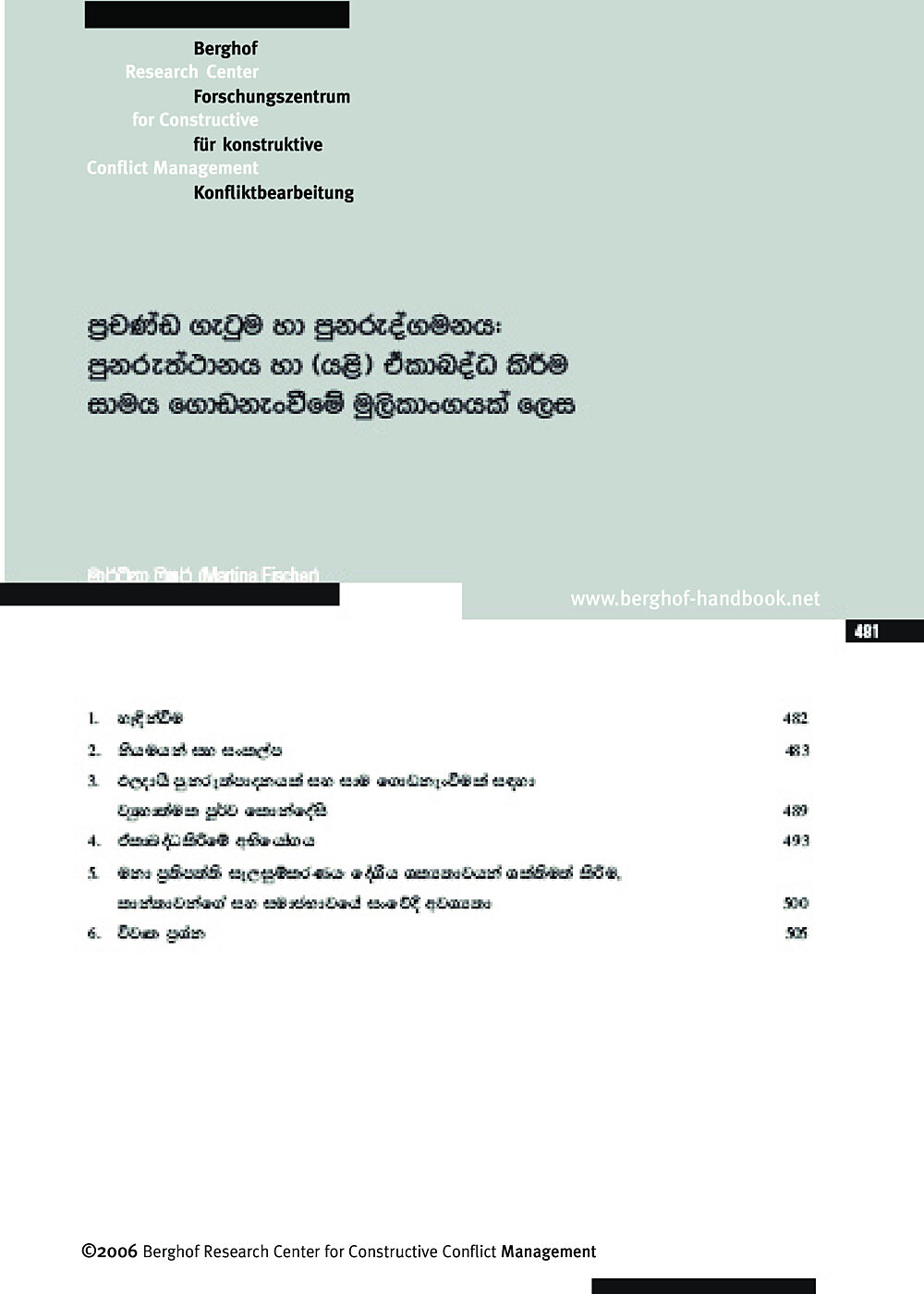
ප්රචණ්ඩ ගැටුම සහ පුනරුද්ගමනය: පුනරුත්ථාපනය හා (යළි) ඒකාබද්ධ කිරීම සාමය ගොඩනැංවීමේ මූලිකාංගයක් ලෙසHandbook Article
[සාරාංශ යන්ත්රයෙන් පරිවර්තනය කරන ලද] සරණාගතයින් සහ අවතැන්වූවන් නැවත ඒකාබද්ධ කිරීම ප්රධාන අභියෝගයක් වන අතර ගැටුම් පරිවර්තනය සඳහා පූර්ව කොන්දේසියකි. මෙම ක්රියාවලියේදී සිවිල් සමාජ සම්බන්ධතා, සාම අධ්යාපනය සහ සමාජ වැඩ සඳහා සංවර්ධනය, ආර්ථික ඉදිරිදර්ශනය සහ දේශීය ක්රියාකාරීන් සවිබල ගැන්වීම ඒකාබද්ධ කිරීමේ උත්සාහයන් අවශ්ය වේ. ක්රියාකාරකම් සම්බන්ධීකරණය ඉතා වැදගත් බව බෝල්කන් පාඩම් වලින් පැහැදිලි වේ. (2004 මුද්රණ සංස්කරණය සඳහා සංශෝධනය කරන ලදි)
- Year 2007
- Author(s) Martina Fischer
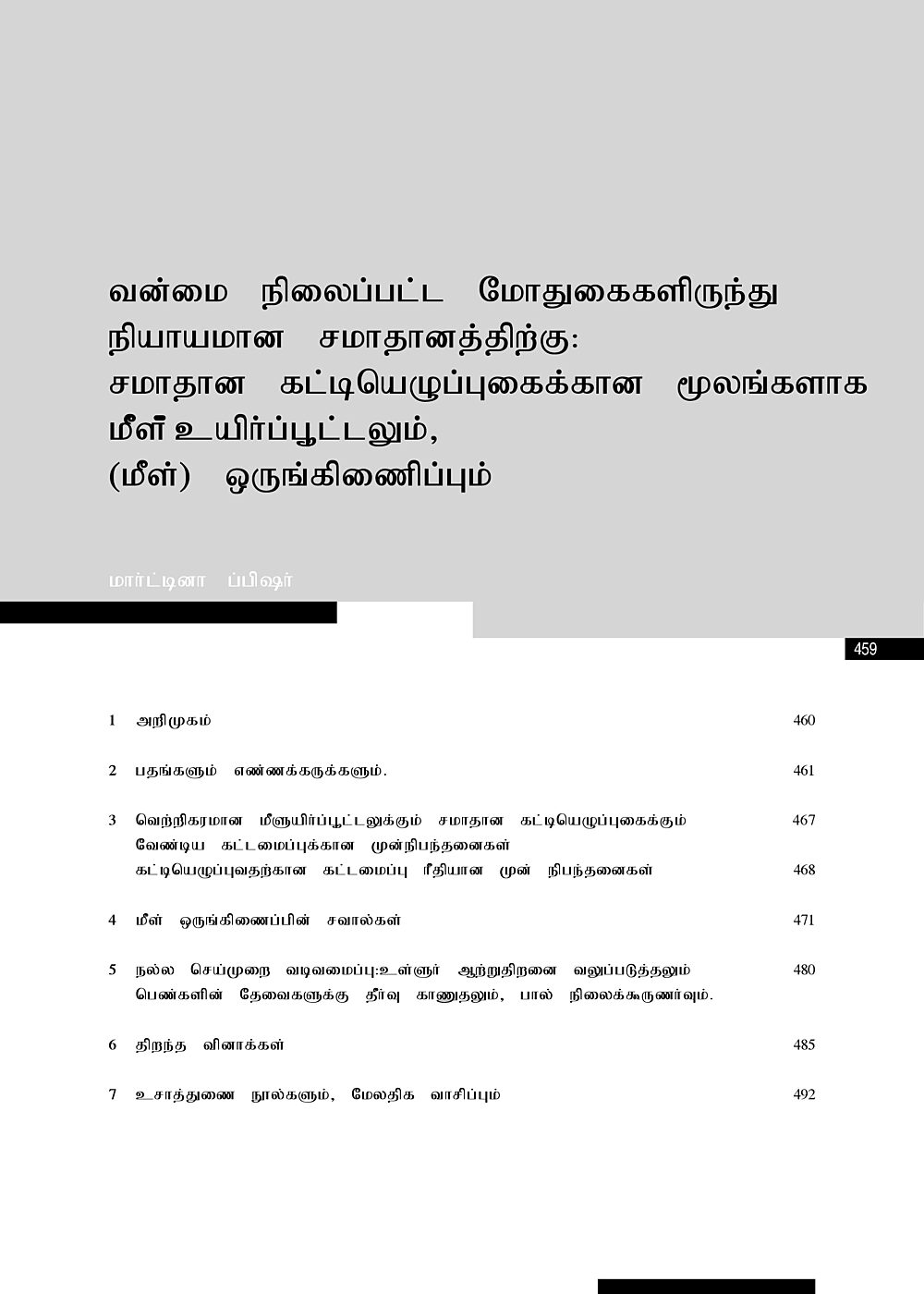
வன்மை நிலைப்பட்ட மோதுகைகளிருந்து நியாயமான சமாதானத்திற்கு: சமாதான கட்டியெழுப்புகைக்கான மூலங்களாக மீள்உயிர்ப்பூட்டலும் (மீள்)ஒருங்கிணைப்பும்Handbook Article
[சுருக்கம் இயந்திரம்-மொழிபெயர்க்கப்பட்ட] அகதிகள் மற்றும் இடம்பெயர்ந்த நபர்களை (மறு) ஒருங்கிணைப்பது முக்கிய சவால்களில் ஒன்றாகும் மற்றும் மோதல் மாற்றத்திற்கான ஒரு முன் நிபந்தனையாகும். இந்த செயல்பாட்டில், சிவில்-சமூக ஈடுபாடு, அமைதி கல்வி மற்றும் சமூகப் பணிகளுக்கு உள்ளூர் நடிகர்களின் வளர்ச்சி, பொருளாதார முன்னோக்குகள் மற்றும் அதிகாரம் ஆகியவற்றை இணைக்கும் கூட்டு முயற்சிகள் தேவை. நடவடிக்கைகளின் ஒருங்கிணைப்பு முக்கியமானது என்பதை பால்கன் பாடங்கள் விளக்குகின்றன. (2004 அச்சு பதிப்பிற்காக திருத்தப்பட்டது)
- Year 2007
- Author(s) Martina Fischer